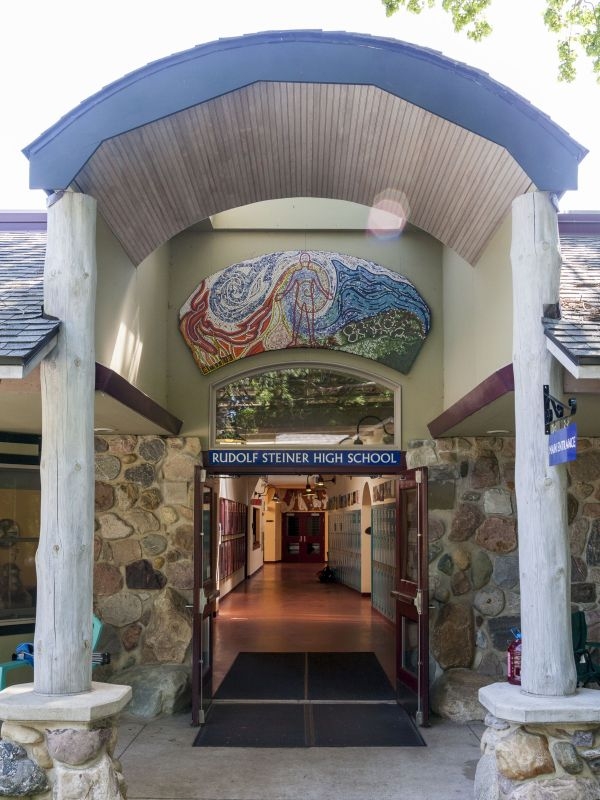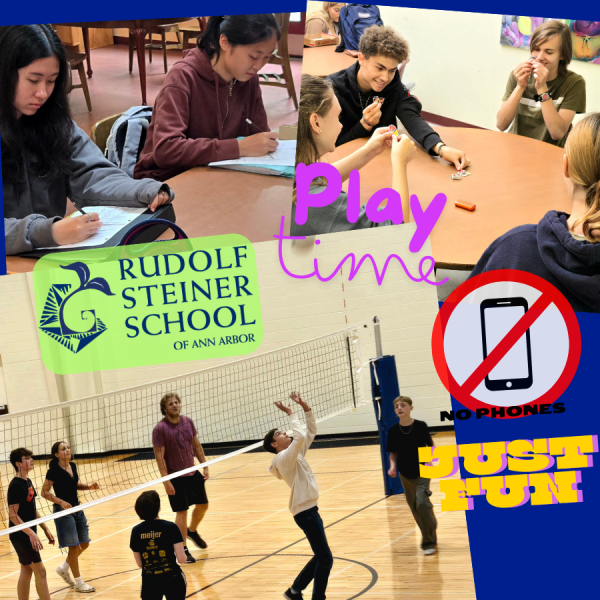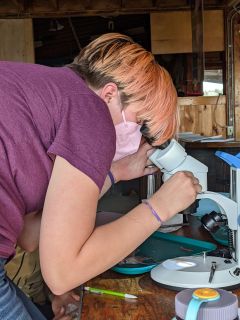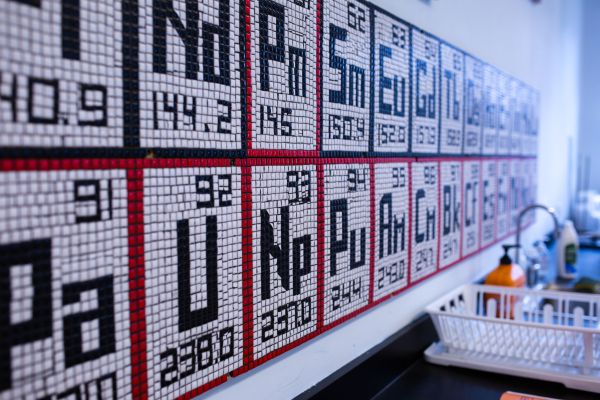

Selecting a High School

Selecting a High School
Advice from Veteran Waldorf Educators
Choosing the right high school can feel like one of the most significant decisions a family will make in their child’s educational journey.
To bring clarity to this decision, we turned to two of our most experienced educators at the Rudolf Steiner School of Ann Arbor: Margot Amrine, a longtime Waldorf teacher with over four decades of experience, and Dr. Siân Owen-Cruise, our former School Administrator, who has guided countless families through the high school selection process.
Today’s parents listen to and respect their children’s perspectives more than ever before- a positive shift in family dynamics. But as Margot reminds us, that doesn’t mean parents should surrender their leadership on big decisions.
“In our family we said that Waldorf Education for 9th and 10th grade was essential. At 11th grade, a different kind of maturity sets in; if our children had made compelling reasons to leave then, we would have considered. We never had these discussions!”
Dr. Owen-Cruise expands on this, acknowledging that social pressures play an outside role in an 8th Grader's thinking:
“It's natural for teenagers to focus on their peers and social dynamics when thinking about high school. As parents, we listen, we understand, and we take their feelings seriously- but ultimately, we need to lead this decision with wisdom and foresight.”
Dr. Owen-Cruise often frames the conversation with the rising student in the following way:
“Your parents will choose where you receive your high school education, with your input. YOU will choose where you go to college, with our parental input.”
Many families who have walked this path find that their children- whether they started in Waldorf Education or joined from another school-ultimately express gratitude that their parents guided this decision with their long-term development in mind.
Here are some other helpful tips and information when thinking about our own High School:
Waldorf Graduates Pursue Meaningful Careers
“Will My Child Succeed After Waldorf High School? The Research Says Yes” - Blog Article
Parents often ask: Does a Waldorf education prepare students for college, careers, and beyond? The answer is a resounding yes. Studies show that Waldorf graduates not only attend college at high rates but also excel in fields like science, medicine, law, and technology. Employers and universities consistently praise their ability to think critically, communicate effectively, and adapt to a changing world. Want to know why? This article dives into the research and real-world successes of our alumni.
The Joy of a Phone-Free School: How Our Students Thrive Without Screens
"The Joy of a Phone-Free School: How Our Students Thrive Without Screens" - Blog Article
In an age where screens dominate every aspect of life, imagine a school where students engage in real conversations, dive into hands-on projects, and focus fully in class—without the pull of notifications. Our phone-free policy isn’t just a rule; it’s a game-changer. See how it shapes our students’ social and academic lives!
The Joy of a Phone-Free School: How Our Students Thrive Without Screens

The Joy of a Phone-Free School: How Our Students Thrive Without Screens
Imagine a typical school day where students, between classes and during breaks, are glued to their smartphones—scrolling through social media, playing games, or texting. Conversations are sparse, eye contact is minimal, and the vibrant energy of youthful interaction seems subdued. Now, contrast this with a school environment where smartphones are set aside: students engage in lively face-to-face discussions, participate in spontaneous games, and immerse themselves fully in classroom activities without the constant pull of notifications. This is the reality we’ve cultivated at Rudolf Steiner School of Ann Arbor, embracing a phone-free policy that fosters genuine connections and holistic development.
The Deeper Engagement of Phone-Free Education
At our school, we’ve observed that removing smartphones from the school day does more than just eliminate distractions—it rekindles a deeper, more meaningful engagement among students. Freed from screens, students rediscover the joy of direct communication, collaborative problem-solving, and hands-on learning. This environment aligns seamlessly with the principles of Waldorf education, emphasizing experiential learning and nurturing the whole child.
We Are Phone-Free, Not Tech-Free
While our school maintains a phone-free environment during school hours, we are not devoid of technology. In fact, our curriculum incorporates technology in age-appropriate ways to ensure students are prepared for the digital world:
• Middle School: Students are introduced to computers and the internet in an intentional way that supports learning. Additionally, our middle school robotics club fosters interest in technology and engineering through hands-on projects. https://www.steinerschool.org/programs/extracurricular-activities.cfm
• High School: Our state-of-the-art computer lab facilitates courses in coding, digital literacy, and other computer science subjects. We also have an active high school robotics club where students collaborate on competitive projects that develop real-world problem-solving skills. https://www.steinerschool.org/about-us/waldorf-education.cfm
Many of our graduates go on to thrive in technology fields, excelling in computer science, engineering, and data analysis. Research shows that Waldorf graduates develop strong interdisciplinary thinking skills that prepare them for success in fields that require both creativity and technical expertise.
Leading the Way in Ann Arbor
Our commitment to a phone-free school day positions us as pioneers in the Ann Arbor educational community. While some other local schools have implemented partial restrictions, our comprehensive approach ensures that students remain unplugged throughout the day—including breaks and transitions between classes.
Several Ann Arbor schools are recognizing the value of limiting phone use:
• Forsythe Middle School and Tappan Middle School both require students to keep phones in lockers during school hours. https://forsythe.a2schools.org/our-school/cell-phone-policy, https://tappan.a2schools.org/our-school/cell-phone-policy
• Huron High School has introduced classroom phone storage policies in its Mathematics and English departments to help students stay focused. https://thehuronemery.com/9731/news/cell-phone-use-teacher-led-procedures-to-enrich-student-experience/
The Transformative Power of Disconnecting
The shift to a phone-free environment has yielded profound benefits:
• Enhanced Academic Focus: Without the allure of smartphones, students engage more deeply in lessons, leading to improved comprehension and retention.
• Strengthened Social Bonds: Face-to-face interactions during breaks and collaborative projects foster authentic relationships and empathy among students.
• Improved Mental Well-being: Reducing screen time has been linked to decreased anxiety and stress, allowing students to be more present and mindful.
Embracing a Connected Future Without Phones
As more schools recognize the value of limiting smartphone use, it’s evident that this movement is not about restricting technology but about reclaiming the essence of human connection and focused learning. By leading the way in this initiative, Rudolf Steiner School of Ann Arbor not only adheres to the foundational principles of Waldorf education but also prepares students for careers in STEM, the arts, and beyond.
We invite families seeking a nurturing, distraction-free educational environment to join us in this journey, where students can truly engage with the world around them and develop into well-rounded individuals.
Explore the experiences of other schools with phone-free policies:
• “New data reveals shocking trend since school mobile phone ban”
- “The big smartphone school experiment”
https://www.thetimes.co.uk/article/inside-schools-ban-smartphones-6knb8qtfc
- “Cell phones hinder classroom learning. Texas should tell school districts to lock them up”
- "Waldorf Schools are Media Literacy Role Models"
https://www.steinerschool.org/about-us/waldorf-schools-are-media-literacy-role-models/
The Power of Hands-On Science Education
Research shows that hands-on learning is extremely effective for students of all ages, particularly when it comes to science education. Waldorf Education employs an experiential approach in all subjects, especially in science. Students learn through observation and experimentation, rather than just memorizing formulas. This engages the senses and encourages critical thinking and problem-solving, which fosters wonder, curiosity, and a deeper understanding of scientific phenomena.
Learning about science through listening to lectures and reading about it, though valuable, isn’t always enough to truly engage students. Learning by doing science through hands-on science activities and experiments lets students see what they’ve learned in action and develop a deeper understanding of the subject. Hands-on learning is just another way to refer to learning by doing. Allowing students to discover more about scientific concepts through hands-on science activities, experiments, and projects is a proven way to increase engagement and academic achievement.
 A study done by the Canadian Center of Science and Education found that children can learn mathematics and sciences effectively even before being exposed to formal school curriculum if basic mathematics and science concepts are communicated to them early using activity-oriented (hands-on) methods of teaching. Mathematics and science are practical and activity oriented and can best be learned through inquiry (Okebukola in Mandor, 2002) and through intelligent manipulation of objects and symbols (Ekwueme, 2007). The study looked at the impact of a hands-on approach on students’ academic performance and the students’ opinion about this activity-based methodology and showed positive improvement in both the students’ performance and participation in mathematics and basic science activities and willingness on the part of the teachers to use hands-on approaches in communicating mathematical and scientific concepts to their students.
A study done by the Canadian Center of Science and Education found that children can learn mathematics and sciences effectively even before being exposed to formal school curriculum if basic mathematics and science concepts are communicated to them early using activity-oriented (hands-on) methods of teaching. Mathematics and science are practical and activity oriented and can best be learned through inquiry (Okebukola in Mandor, 2002) and through intelligent manipulation of objects and symbols (Ekwueme, 2007). The study looked at the impact of a hands-on approach on students’ academic performance and the students’ opinion about this activity-based methodology and showed positive improvement in both the students’ performance and participation in mathematics and basic science activities and willingness on the part of the teachers to use hands-on approaches in communicating mathematical and scientific concepts to their students.
What Is Hands-On Science?
Hands-on science can be defined as students getting their hands on materials, performing experiments, exploring phenomena, and trying out ideas. According to research, hands-on science usually involves “physical materials to give students first-hand experience in scientific methodologies” but can also include virtual labs. Labs, experiments, and projects are all potential hands-on science activities.
Why Hands-On Learning Is Important in Science
Hands-on learning is more than just a way to get students to experiment with science equipment or be immersed in a virtual world. Also, hands-on learning does more than bring fun to learning. This approach is proven to increase student engagement and understanding of scientific concepts.
Hands-on learning can also connect to inquiry-based learning in science, another teaching approach that’s proven to increase student engagement. Inquiry-based science instruction encourages students to ask questions they are interested in and investigate those questions. Hands-on science is one of many ways students can explore inquiries, whether the procedure is designed by the teacher or student. Let’s delve into the additional benefits of hands-on learning in science.
Benefits of Hands-On Learning in Science
Increases Retention: Active learning, such as through hands-on activities, has been proven to be effective at promoting retention. When students apply what they’ve learned in the classroom through hands-on science experiments and activities, students can better understand concepts.
- Improves Performance on Assessments: Research from the University of Chicago shows that hands-on science can improve student outcomes. Participating in the learning process through learning by doing helps students forge a deeper understanding of the scientific concepts taught in class.
- Provides a Sense of Accomplishment: Teachers have recognized that hands-on science provides students with a sense of accomplishment. At the end of a hands-on activity or experiment, students can see the immediate results of their learning. Learning new ideas can take a long time, but when the learning is hands-on, students reach a clear stopping point and can look back at what they did.
- Supports Students with Learning Barriers: Hands-on learning is a proven way to support students with learning barriers, such as multilingual learners and students with autism. Research has shown that students who are just beginning to learn English can benefit from visual resources and hands-on activities that help them understand new words and concepts in English. Additionally, research has shown that hands-on learning can enhance the learning process for students with autism.
- Develops Critical Thinking Skills: Overall, hands-on learning develops students’ critical thinking skills. Through doing hands-on activities and experiments, students have the chance to connect to and apply what they’ve learned in class to complete their projects.


Check this for more information !, Rajawali888 ,
If you are looking for the best games in Southeast Asia, Rajawali888 or Rajawali888, or this Rajawali888 it will be more interesting